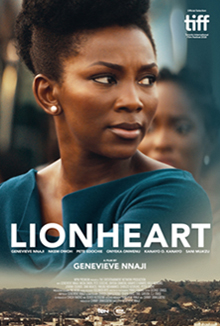This is a Nigerian film that made headlines a couple of years ago and given the growing prominence of Nigerian cinema, it seemed appropriate to watch one of them. It has been lauded as a film about female empowerment but I think this applies more to real life more than the in-story events. Lead actress Genevieve Nnaji is also the director and main scriptwriter so it’s very much her show.
Adaeze Obiagu works hard at managing Lionheart, the bus transport company owned by her father and is kept especially after a recent fleet expansion in order to bid for a government transport project. When her obese father is incapacitated by a health issue, she expects to be named as his replacement and so is dismayed when her uncle, her father’s brother, Godswill, is chosen instead. It only gets worse when they learn that her father has borrowed large sums of money in order to buy new buses without telling anyone and the creditors want to call in the loans in 14 days. Adaeze and Godswill are at odds over how to resolve the crisis with their different approaches, but are united in rejected a buyout bid from a local rival. Adaeze is also resentful that she isn’t being taken seriously even by her own family because she is a woman.
Given this film’s reputation, I expected this to be a serious drama. Indeed, there is a point, early on, when that seemed to be true as Adaeze has to talk down angry workers ready to resort to violence. They accuse her of being an Americanized Nigerian with no idea of how hard life is for normal Nigerians and from what we can see of her lifestyle, this certainly seems accurate. Having a big black SUV with tinted windows follow her around as she jogs early in the morning is a sound security precaution but is also something that is far out of the reach of most Nigerians. But then she manages to calm them down by promising them that they will get their money and offers only bromides about how real Nigerians shouldn’t stand in the way of development. After Adaeze is applauded as a hero by the rest of the staff for nipping this crisis in the bud, this particular complaint is never heard of again and we never revisit the issue of Adaeze’s family being part of the aristocratic elite. This firmly lays to rest any hope of this being a serious film.
The best that can be said of it is that it is at least not offensively bad, just awfully old-fashioned. It even goes easy on the female empowerment as the real lesson here for Adaeze seems to be that she should stop and properly respect the ideas of those from the older generation like her uncle Godswill. Despite the fact that the advice from her parents consist of nothing more than empty platitudes instead of concrete, specific directions, we are still expected to regard them as insightful and inspiring pep talks. As my wife noted, it’s something that you might expect out of a soap opera from the 1980s or something. Even its conception of how business works is laughably simple as it in no way resembles a realistic portrayal of the typical work day of a busy top level executive. It is especially appalling that Adaeze does not seem to be able to read the company’s accounts for herself or that a loan of that magnitude with all of the associated documentation should somehow be invisible to the person who is effectively running the company.
It is kind of nice to have a look at the Nigerian setting and it is heartening that they are trying at all, but in the end this is just not a very impressive film. One intriguing bit here is that the Obiagus are clearly Christians while the Maikanos in the north appear to be Muslims. This is evident in their way of dress and the shots of Kano where they are based in the north of Nigeria with its prominent mosques. Therefore hinting of a romantic relationship between Adaeze and the scion of the Maikonos is really quite something, but a hint is as far as the film is willing to go here.
